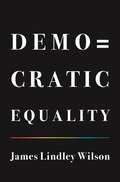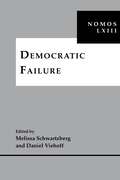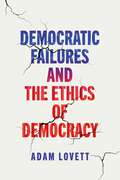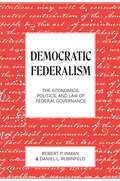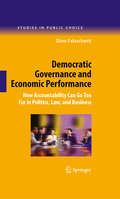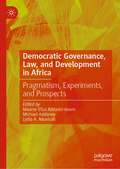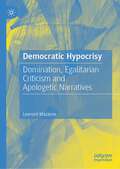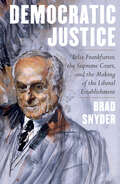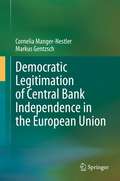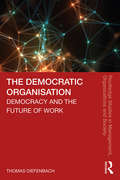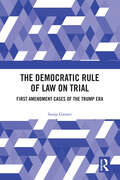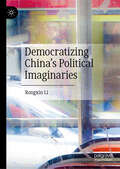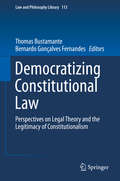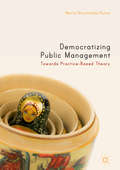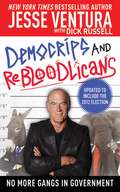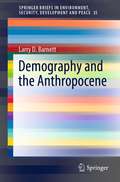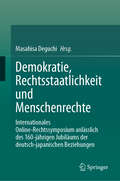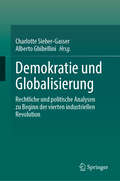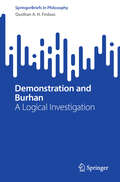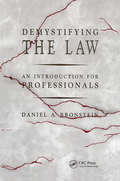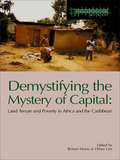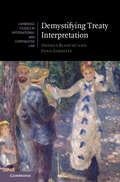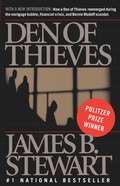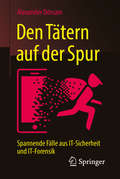- Table View
- List View
Democratic Equality
by James Lindley WilsonDemocracy establishes relationships of political equality, ones in which citizens equally share authority over what they do together and respect one another as equals. But in today's divided public square, democracy is challenged by political thinkers who disagree about how democratic institutions should be organized, and by antidemocratic politicians who exploit uncertainties about what democracy requires and why it matters. Democratic Equality mounts a bold and persuasive defense of democracy as a way of making collective decisions, showing how equality of authority is essential to relating equally as citizens.James Lindley Wilson explains why the US Senate and Electoral College are urgently in need of reform, why proportional representation is not a universal requirement of democracy, how to identify racial vote dilution and gerrymandering in electoral districting, how to respond to threats to democracy posed by wealth inequality, and how judicial review could be more compatible with the democratic ideal. What emerges is an emphatic call to action to reinvigorate our ailing democracies, and a road map for widespread institutional reform.Democratic Equality highlights the importance of diverse forms of authority in democratic deliberation and electoral and representative processes—and demonstrates how that authority rests equally with each citizen in a democracy.
Democratic Failure: NOMOS LXIII (NOMOS - American Society for Political and Legal Philosophy #35)
by Melissa Schwartzberg Daniel ViehoffExplores the challenges facing democracies in the twenty-first centuryIn Democratic Failure, Melissa Schwartzberg and Daniel Viehoff bring together a distinguished group of interdisciplinary scholars in political science, law, and philosophy to explore the key questions and challenges facing democracies, both in the past and present, around the world.In ten timely essays, contributors examine the fascinating, centuries-old question of whether or not democracy can ever fulfill the promise of its ideals. Together, they explore lessons from the history of democracy, various failures of democratic representation, and more. Ultimately, this latest installment of the NOMOS series provides thought-provoking insights into how we conceptualize, measure, and address democratic erosion in our present-day world.
Democratic Failures and the Ethics of Democracy (Democracy, Citizenship, and Constitutionalism)
by Adam LovettIn Democratic Failures and the Ethics of Democracy, political philosopher Adam Lovett argues that when it comes to democratic ideals, the United States is a failed democracy. Specifically, he contends that American democracy has failed to advance equality and self-rule for its citizens—qualities he identifies as essential components of democracy’s intrinsic value. Drawing on rich empirical research, Lovett applies original philosophical analysis to reveal real-world democratic failures and evaluate their philosophical and ethical consequences.His research locates democratic failures at both the level of political elites and at the level of the masses. At the elite level, elected officials shape policy to prioritize the interests of their supporters, where wealthy individuals and corporations are the most influential. At the mass level, ordinary citizens are motivated to vote not to introduce specific policies but by party identification. By mapping how these failures erode equality and self-rule, he demonstrates that they in fact undermine the ethics of democracy itself. After all, Lovett argues, when a state fails to represent ordinary citizens, those ordinary citizens are not morally obligated to follow the laws of the state.Because the state fails to achieve democratic values in any meaningful way, its claim to political authority and legitimacy is diminished. However, Lovett does not conclude that American democracy is doomed—he instead proposes solutions from voting only on referendums to delegating aspects of public policy to unelected experts without partisan obligation. These reforms are vital for compelling the state to act on behalf of all citizens, not just the partisan or the powerful. Of interest to political scientists and political philosophers alike, Democratic Failures and the Ethics of Democracy sheds light on an increasingly troubled democratic ethos and proposes solutions for how ordinary citizens can work to save it.
Democratic Federalism: The Economics, Politics, and Law of Federal Governance
by Robert Inman Daniel L. RubinfeldAn authoritative guide to federal democracy from two respected experts in the fieldAround the world, federalism has emerged as the system of choice for nascent republics and established nations alike. In this book, leading scholars and governmental advisers Robert Inman and Daniel Rubinfeld consider the most promising forms of federal governance and the most effective path to enacting federal policies. The result is an essential guide to federalism, its principles, its applications, and its potential to enhance democratic governance.Drawing on the latest work from economics, political science, and law, Inman and Rubinfeld assess different models of federalism and their relative abilities to promote economic efficiency, encourage the participation of citizens, and protect individual liberties. Under the right conditions, the authors argue, a federal democracy—including a national legislature with locally elected representatives—can best achieve these goals. Because a stable union between the national and local governments is key, Inman and Rubinfeld also propose an innovative method for evaluating new federal laws and their possible impact on state and local governments. Finally, to show what the adoption of federalism can mean for citizens, the authors discuss the evolution of governance in the European Union and South Africa’s transition from apartheid to a multiracial democracy.Interdisciplinary in approach, Democratic Federalism brims with applicable policy ideas and comparative case studies of global significance. This book is indispensable for understanding the importance of federal forms of government—both in recent history and, crucially, for future democracies.
Democratic Governance and Economic Performance
by Dino FalaschettiConventional wisdom warns that unaccountable political and business agents can enrich a few at the expense of many. But logically extending this wisdom implies that associated principals - voters, consumers, shareholders - will favor themselves over the greater good when 'rules of the game' instead create too much accountability. Democratic Governance and Economic Performance rigorously develops this hypothesis, and finds statistical evidence and case study illustrations that democratic institutions at various governance levels (e.g., federal, state, corporation) have facilitated opportunistic gains for electoral, consumer, and shareholder principals. To be sure, this conclusion does not dismiss the potential for democratic governance to productively reduce agency costs. Rather, it suggests that policy makers, lawyers, and managers can improve governance by weighing the agency benefits of increased accountability against the distributional costs of favoring principal stakeholders over more general economic opportunities. Carefully considering the fundamentals that give rise to this tradeoff should interest students and scholars working at the intersection of social science and the law, and can help professionals improve their own performance in policy, legal, and business settings.
Democratic Governance, Law, and Development in Africa: Pragmatism, Experiments, and Prospects
by Maame Efua Addadzi-Koom Michael Addaney Lydia A. NkansahThis volume analyses democratic governance, the rule of law and development in Africa. It is unique and timely. First, the theme and sub-themes were carefully selected to solicit quality chapters from academics, practitioners and graduate students on topical and contemporary issues in constitutional law, human rights, and democratic governance in Africa. The chapters were subjected to a single-blind peer review by experts and scholars in the relevant fields to ensure that high quality submissions are included. Due to the dearth of knowledge and studies on the chosen thematic areas, the publication will remain relevant after several years due to the timeless themes it covers. In this regard, this edited volume audits the progress of democratic consolidation, rule of law and development in Ghana with selected case studies from other African countries. This book is intended for higher education institutions (universities, institutes and centres), public libraries, general academics, practitioners and students of law, democracy, human rights and political science, especially those interested in African affairs.
Democratic Hypocrisy: Domination, Egalitarian Criticism and Apologetic Narratives
by Leonard MazzoneUnconfessed by definition, hypocrisy is one of the most used and abused polemical categories, even today, to denounce the "masked cynicism" of certain social actors, especially when they hold public office. But has hypocrisy always been just that? Should we really always be wary of it and challenge its every manifestation? What forms of hypocrisy can we distinguish? What kind of relationship exists between hypocrisy and the lack of self-critical attitude of those who are used to challenge the conduct of others? And above all: what relationship exists between this common vice, democratic politics and the institutional reproduction of different forms of oppression and domination? These are just some of the questions that inspire this philosophical journey back into the history of one of the most chameleonic concepts of Western culture. In Mazzone’s conception, democratic hypocrisy includes argumentative strategies used by institutional actors to refuse any kind of responsibility when their decisions, actions or roles are called into question by the protests of citizens in a democratic context. He reveals the relationship that exists between such “apologetic narratives” and the institutional reproduction of different forms of oppression and domination. Ultimately, the book urges civic vigilance against underhand wannabe authoritarians, who – as a group – are evolving to find new ways to trick people into opposing democracy.
Democratic Justice: Felix Frankfurter, The Supreme Court, And The Making Of The Liberal Establishment
by Brad SnyderThe definitive biography of Felix Frankfurter, Supreme Court justice and champion of twentieth-century American liberal democracy. The conventional wisdom about Felix Frankfurter—Harvard law professor and Supreme Court justice—is that he struggled to fill the seat once held by Oliver Wendell Holmes. Scholars have portrayed Frankfurter as a judicial failure, a liberal lawyer turned conservative justice, and the Warren Court’s principal villain. And yet none of these characterizations rings true. A pro-government, pro-civil rights liberal who rejected shifting political labels, Frankfurter advocated for judicial restraint—he believed that people should seek change not from the courts but through the democratic political process. Indeed, he knew American presidents from Theodore Roosevelt to Lyndon Johnson, advised Franklin Roosevelt, and inspired his students and law clerks to enter government service. Organized around presidential administrations and major political and world events, this definitive biography chronicles Frankfurter’s impact on American life. As a young government lawyer, he befriended Theodore Roosevelt, Louis Brandeis, and Holmes. As a Harvard law professor, he earned fame as a civil libertarian, Zionist, and New Deal power broker. As a justice, he hired the first African American law clerk and helped the Court achieve unanimity in outlawing racially segregated schools in Brown v. Board of Education. In this sweeping narrative, Brad Snyder offers a full and fascinating portrait of the remarkable life and legacy of a long misunderstood American figure. This is the biography of an Austrian Jewish immigrant who arrived in the United States at age eleven speaking not a word of English, who by age twenty-six befriended former president Theodore Roosevelt, and who by age fifty was one of Franklin Roosevelt’s most trusted advisers. It is the story of a man devoted to democratic ideals, a natural orator and often overbearing justice, whose passion allowed him to amass highly influential friends and helped create the liberal establishment.
Democratic Legitimation of Central Bank Independence in the European Union
by Cornelia Manger-Nestler Markus GentzschThis short monograph examines the tense relationship between central bank independence and democratic legitimation, which has changed as the European Central Bank (ECB) has been entrusted with new tasks and faced unprecedented challenges. The financial and sovereign debt crisis, in particular, has affected the ECB's position within the Economic and Monetary Union without substantial changes in the Union's legal framework. However, the evolution of an institution primarily obligated to maintain price stability into an actor involved in sustaining financial stability, performing banking supervision and supporting economic policy raises the question of whether the high level of autonomy granted to the ECB is justified with regard to the principle of democracy that demands adequate accountability and control. This book identifies requirements for the democratic legitimation of central bank action in relation to specific tasks. Further, it analyses other scales of independence encountered in EU law in order to allow readers to gain a better conceptual understanding of central bank independence.
The Democratic Organisation: Democracy and the Future of Work (Routledge Studies in Management, Organizations and Society)
by Thomas DiefenbachPrevailing models of organisation divide people into owners, managers and employees, forcing especially the latter to obey, to behave, and to function well within a hierarchical and managerial pecking order. However, there is no natural law suggesting the need for such organisations, not in market economies and definitely not in modern democratic societies – and there is no justification for such types of organisation. Arguing that most current organisations are orthodox, hierarchical, anti-democratic, oppressive, unfair, and unjust, this book presents a viable alternative, a better type of organisation – the democratic organisation. Diefenbach develops and provides step by step a systematic, comprehensive, thorough, and detailed general model of the democratic organisation. He describes the democratic organisation’s fundamental principles, values, governance, management, structures, and processes, and the ways it functions and operates both within the organisation and towards others and the environment. Crucially, and most importantly, the democratic organisation provides the institutions and organisational context for individuals to maintain and pursue their fundamental freedoms, inalienable rights, and dignity; to manage organisations in democratic, participative, and cooperative ways; and to conduct business in considerate, balanced, and sustainable ways. This book will be of interest to researchers, academics, practitioners, and students in the fields of management, organisation studies, strategic management, business ethics, entrepreneurship, and family business.
The Democratic Rule of Law on Trial: First Amendment Cases of the Trump Era
by Sonja GroverThis book examines selected high-profile U.S. First Amendment cases occurring during the Trump era as a vehicle for exploring a possible fundamental commonality in understanding the democratic rule of law globally. In each of these cases, the adjudicating body’s analytical legal strategy is discussed in terms of how it reinforces or detracts from the democratic rule of law. It was and continues to be highly internationally anticipated as to what legal examples are being set by this established democracy when confronted by legal contests between the former Trump administration and those alleging their rights were somehow violated by the executive of that time. Thus, the book is instructive for an international audience on the essential role of the courts in protecting democracy through providing, where supported by the law and the facts, a remedy for the aggrieved comparatively powerless. The book will be essential reading for academics and researchers working in the areas of constitutional law, politics and human rights.
Democratizing China’s Political Imaginaries
by Rongxin LiThis book offers a meticulous empirical examination of Chinese democracy and its myriad discourses. Delving into the intricate workings of Chinese democracy, the author explores how the Chinese Communist Party employs democratic principles, how intellectuals grapple with the concept, and how the populace perceives and engages with democracy. In transcending mere methodological nationalism, this narrative extends to the global stage, offering insights into democratic evolution beyond Western paradigms by exploring resonates particularly with developing and post-colonial countries, offering a fresh perspective on the delicate balance between state capacity, social order, and the democratization process. While the trajectory of democracy in China remains uncertain, these empirically grounded analyses provide a pragmatic lens through which to contemplate the future of Chinese political dynamics.
Democratizing Constitutional Law
by Thomas Bustamante Bernardo Gonçalves FernandesThis volume critically discusses therelationship between democracy and constitutionalism. It does so with a view torespond to objections raised by legal and political philosophers who aresceptical of judicial review based on the assumption that judicial review is anundemocratic institution. The book builds on earlier literature on the moraljustification of the authority of constitutional courts, and on the currentattempts to develop a system on "weak judicial review". Although different intheir approach, the chapters all focus on devising institutions, proceduresand, in a more abstract way, normative conceptions to democratizeconstitutional law. These democratizing strategies may vary from a radicalobjection to the institution of judicial review, to a more modest proposal tojustify the authority of constitutional courts in their "deliberativeperformance" or to create constitutional juries that may be more aware of acommunity's constitutional morality than constitutional courts are. The book connects abstract theoreticaldiscussions about the moral justification of constitutionalism with concreteproblems, such as the relation between constitutional adjudication anddeliberative democracy, the legitimacy of judicial review in internationalinstitutions, the need to create new institutions to democratizeconstitutionalism, the connections between philosophical conceptions andconstitutional practices, the judicial review of constitutional amendments, andthe criticism on strong judicial review.
Democratizing Public Management: Towards Practice-Based Theory
by Marta Struminska-KutraThis book argues that contemporary society in general, and public administration specifically, can benefit from more reflexive learning processes through democracy and public involvement. It identifies the most central social practices, dilemmas, and challenges for public management as well as the mechanisms needed to enact institutional change. Offering a model of reflexivity and learning in the face of public dispute, it explores phenomena such as problem solving, democratization, public learning, and uncertainty to address certain tensions in governance theory and practice.Through a range of well-sourced case studies, this book demonstrates how institutions can manage difficult situations by not only resolving the conflict but addressing the underlying problem. It uses both theoretical and practical approaches to observe the micro foundations of political behavior and its institutional underpinnings, and will be a valuable resource for public administration researchers, practitioners, and graduate students seeking empirical studies of learning processes in the public sphere.
DemoCRIPS and ReBLOODlicans: No More Gangs in Government
by Jesse Ventura Dick RussellDemoCRIPS and ReBLOODlicans uncovers the truth about how corporations have bought the American electoral and legislative process through the power of lobbyists, campaign contributions and political action committees. Covering historical details such as the development of the two-party system and the advent of third-party candidates throughout US history, DemoCRIPS and ReBLOODlicans exposes how the two-major parties, acting like a gang-land cabal, have allowed corporations, businesses and politically-motivated wealthy individuals to manipulate elections, bribe elected officials and, in short, silence the average American voter.Exposing the ineptitude of both parties at insuring the integrity and vitality of American democracy, Jesse Ventura advocates the replacement of the two-party system for a no party system based on the ideals of our Founding Fathers. As election time rolls around, this is most certainly the book that should be looked at for reforming our electorate system. The knowledge and research that have gone into DemoCRIPS and ReBLOODlicans is unmatched, and if there was to be change, this is most certainly where it should start!
Demography and the Anthropocene (SpringerBriefs in Environment, Security, Development and Peace #35)
by Larry D. BarnettEnvironmentalists devote little attention at the moment to the size and growth of the human population. To counter this neglect, the monograph (i) includes original graphs showing population size and growth since 1920 in the world as a whole and the United States; (ii) assembles evidence tying the increasing number of people to ecosystem deterioration and its societal consequences; and (iii) analyzes sample-survey data to ascertain whether the current disregard of population pressures by U.S. environmentalists reflects the thinking of Americans generally. However, even if a nation took steps primarily intended to lower childbearing and immigration, the findings of social science research indicate that the steps would not have a substantial, lasting impact. The discussion, which suggests an indirect way by which government may reduce fertility, underlines for environmental scholars the importance of studying their subject in a multidisciplinary, collaborative setting.
Demokratie, Rechtsstaatlichkeit und Menschenrechte: Internationales Online-Rechtssymposium anlässlich des 160-jährigen Jubiläums der deutsch-japanischen Beziehungen
by Masahisa DeguchiDas Buch basiert auf den Ergebnissen eines internationalen Online-Rechtssymposium anlässlich des 160-jährigen Jubiläums der deutsch-japanischen Beziehungen und setzt sich mit hochaktuellen Fragen zu Demokratie, Rechtsstaatlichkeit und Menschenrechten auseinander. Im ersten Teil steht die Gewährleistung der Grundrechte von Gläubigern und Schuldnern in der deutschen Zwangsvollstreckung sowie Frage- und Antwortrunden zwischen Wissenschaftlern und Praktikern aus der Perspektive des japanischen Zwangsvollstreckungsrechts im Mittelpunkt. In Teil 2 befassen sich Rechtswissenschaftlern und -praktikern aus Deutschland, Japan, Großbritannien und anderen Ländern mit der Bedeutung und den Problemen der Sportschiedsgerichtsbarkeit aus der Perspektive der grundlegenden Menschenrechte. Der dritte Teil behandelt die Corona-Pandemie aus verfassungsrechtlicher, zivilrechtlicher, strafrechtlicher, konkursrechtlicher und arbeitsrechtlicher Sicht. Im vierten Teil beschäftigen sich Rechtswissenschaftler und -praktiker aus Japan, Deutschland, Korea und den Niederlanden mit Fragen der Harmonisierung von Verfassungs- und Verfahrensgrundsätzen im Zuge der Digitalisierung von Zivilprozessen, die sich seit der Corona-Pandemie rasant ausgebreitet hat. Teil 5 geht abschließend auf die Bedeutung des vergleichenden Prozessrechts für die Entwicklung des Zivilprozessrechts in der Welt, sowohl aus theoretischer als auch aus praktischer Sicht ein.
Demokratie und Globalisierung: Rechtliche und politische Analysen zu Beginn der vierten industriellen Revolution
by Charlotte Sieber-Gasser Alberto GhibelliniDieses Buch bietet eine eingehende rechtliche und politische Analyse der Vereinbarkeit des westfälischen Staatsmodells mit der Globalisierung und der digitalen Revolution. Es untersucht das Konzept der Demokratie in einer globalisierten Welt, erörtert die Legitimität der wirtschaftlichen Integration in den globalen Markt und präsentiert drei Fallstudien (aus Brasilien, Taiwan und Spanien) über die Auswirkungen sozialer Medien auf Wahlen. Darüber hinaus werden neue Perspektiven zu den Auswirkungen der Digitalisierung auf nationale Grenzen und auf die Rolle von Bürgerinnen und Bürgern und Expertinnen und Experten bei der Gestaltung der Globalisierung aufgezeigt. Ein abschließendes Kapitel befasst sich mit der Frage, inwieweit die aus den Analysen der oben genannten Aspekte gewonnenen Erkenntnisse bei den Bemühungen um eine Überwindung der aktuellen globalen Gesundheits- und Wirtschaftskrise berücksichtigt werden müssen.
Demonstration and Burhan: A Logical Investigation (SpringerBriefs in Philosophy)
by Qusthan A. FirdausThis book investigates the historical development of Aristotle’s perfect syllogism, or demonstration, into the Muslim world. It provides an accessible account to the modern reader, while at the same time bringing to the discussion the important issue of the specifically Muslim contribution to the field of logic. The author emphasizes the importance of axioms in establishing demonstration and the modern logic of dialetheia - Graham Priest’s idea of some true contradictions - in Islamic discourses. While Muslim philosophers have been claiming that demonstration is equal to burhan in mantiq or logic in Islamic education, this book presents the fact that burhan sets aside the necessity of axioms, making the former seem to be a deviation from Aristotle’s demonstration. The variety of Islamic philosophies has not been adequate enough to develop logic in Islamic education as progressive as its European counterparts. This book is an invitation to students and researchers to reconsider mantiq or logic in Islamic education based upon the Aristotelian logic and the modern logic of dialetheia, given that one cannot comprehend various Islamic discourses simply by exercising the Aristotelian principles of identity, non-contradiction, and excluded middle. In providing a useful overview of Aristotle before launching into a discussion on the various positions that Muslim scholars take regarding demonstration, the author presents a better framework for scholars and students in philosophy and religious studies to grasp several controversial and peculiar ideas in Islam.
Demystifying the Law: An Introduction for Professionals
by Daniel A. BronsteinDemystifying the Law: An Introduction for Professionals explains unfamiliar legal concepts in interesting contexts, thus helping you to understand and remember them. It illustrates legal principles using simple examples that anyone can understand. No single book can turn you into a lawyer, but this one can help you decide when you need a lawyer's assistance and help you ask intelligent questions of your lawyer. It can even help keep you out of situations requiring a lawyer. Part I tells you where our laws come from and how they are applied in the court system. Part II explains the role in law of the executive branch of government, including quasi-legislative and quasi-judicial activities, judicial review, and technicalities and terms. Part III covers several specific legal issues, including civil procedure, criminal law concepts, burden of proof, the "reasonable person" concept, breach of duty, personal and product liability, and malpractice. It also gives brief introductions to contracts, insurance law, workers' compensation, property law, environmental law, water law, and other legal matters. Every professional should own this valuable resource! Ideal for both personal and business use. Appendices include how to find legal citations and extracts from the federal rules of civil procedure.
Demystifying the Mystery of Capital: Land Tenure & Poverty in Africa and the Caribbean
by Robert Home Hilary LimFirst published in 2004. Routledge is an imprint of Taylor & Francis, an informa company.
Demystifying Treaty Interpretation (Cambridge Studies in International and Comparative Law #Series Number 188)
by Andrea Bianchi Fuad ZarbiyevDemystifying Treaty Interpretation doesn't just tell you how treaties are commonly interpreted. It helps you understand also the process of treaty interpretation and its outcomes. The idea that rules of treaty interpretation can guide us to the meaning of treaty provisions, in a simple and straightforward manner, is a myth to be dispelled. This book aims to capture some of the complex and nuanced processes involved in treaty interpretation. It spurs further reflection about how interpretation takes place against the background of concepts, categories, and insights from other disciplines. A useful tool for scholars, practitioners and researchers engaging with treaty interpretation at all levels, the book aims to enhance the reader's knowledge and mastery of the interpretive process in all its elements, with a view to making them more skilled and effective players in the game of interpretation.
Den of Spies: Reagan, Carter, and the Secret History of the Treason That Stole the White House
by Craig UngerThe explosive inside story of the October Surprise conspiracy, a stunning act of treason that changed American history. New York Times bestselling author Craig Unger reveals his thirty-year investigation into the secret collusion between Ronald Reagan’s 1980 presidential campaign and Iran, raising urgent questions about what happens when foreign meddling in our elections goes unpunished and what gets remembered when the political price for treason is victory. It was a tinderbox of an accusation. In April 1991, the New York Times ran an op-ed alleging that Ronald Reagan’s 1980 presidential campaign had conspired with the Iranian government to delay the release of 52 American hostages until after the 1980 election. The Iranian hostage crisis was President Jimmy Carter’s largest political vulnerability, and his lack of success freeing them ultimately sealed his fate at the ballot box. In return for keeping Americans in captivity until Reagan assumed the oath of office, the Republicans had secretly funneled arms to Iran. Treasonous and illegal, the operation—planned and executed by Reagan’s campaign manager Bill Casey—amounted to a shadow foreign policy run by private citizens that ensured Reagan’s victory.Investigative journalist Craig Unger was one of the first reporters covering the October Surprise—initially for Esquire and then Newsweek—and while attempting to unravel the mystery, he was fired, sued, and ostracized by the Washington press corps, as a counter narrative took hold: The October Surprise was a hoax. Though Unger later recovered his name and became a bestselling author on Republican abuses of power, the October Surprise remained his white whale, the project he—as well as legendary investigative journalist, the late Robert Parry—worked on late at night and between assignments.In Den of Spies, Unger reveals the definitive story of the October Surprise, going inside his three-decade reporting odyssey, along with Parry’s never-before-seen archives, and sharing startling truths about what really happened in 1980. The result is a real-life political thriller filled with double agents, CIA operatives, slippery politicians, KGB documents, wealthy Republicans, and dogged journalists. A timely and provocative history that presages our Trump-era political scandals, Den of Spies demonstrates the stakes of allowing the politics of the moment to obscure the writing of our history.
Den of Thieves: The Untold Story Of The Men Who Plundered Wall Street And The Chase That Brought Them Down
by James B. StewartA number-one bestseller from coast to coast, Den of Thieves tells, in masterfully reported detail, the full story of the insider-trading scandal that nearly destroyed Wall Street, the men who pulled it off, and the chase that finally brought them to justice. Pulitzer Prize winner James B. Stewart shows for the first time how four of the biggest names on Wall Street -- Michael Milken, Ivan Boesky, Martin Siegel, and Dennis Levine -- created the greatest insider-trading ring in financial history and almost walked away with billions, until a team of downtrodden detectives triumphed over some of America's most expensive lawyers to bring this powerful quartet to justice.Based on secret grand jury transcripts, interviews, and actual trading records, and containing explosive new revelations about Michael Milken and Ivan Boesky written especially for this paperback edition, Den of Thieves weaves all the facts into an unforgettable narrative -- a portrait of human nature, big business, and crime of unparalleled proportions.
Den Tätern auf der Spur
by Alexander DörsamAus dem Alltag eines digitalen Ersthelfers Der IT-Sicherheitsexperte Alexander Dörsam entführt Sie mit seinem Buch in die spannende Welt von Hacking, Unternehmenserpressung, Spionage und digitalem Vandalismus. Anhand von realen IT-Sicherheitsvorfällen erfahren Sie, wie Angreifer in Firmenstrukturen eindringen, welche Methoden dafür eingesetzt werden und welche Folgen das haben kann. Doch wie schütze ich mich oder mein Unternehmen? Was ist zu tun bei einem digitalen Notfall? Dörsam hilft Ihnen nicht selbst Opfer zu werden, zeigt das IT-Krisenmanagement und gibt Hinweise zur Ersthilfe bei IT-Sicherheitsvorfällen. Ein fesselndes Buch für alle, die mehr über aktuelle digitale Bedrohungen erfahren wollen.
